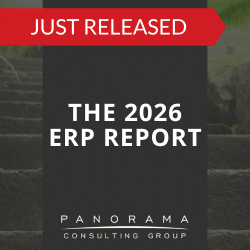You may recognize the German brand Haribo by the iconic Gummy Bears it’s best known for manufacturing. However, Haribo has been in the news recently for another reason, and this one isn’t quite as sweet.
In 2018, the brand kicked off a major SAP ERP implementation meant to streamline its production and modernize its outdated goods management system. However, very shortly after the launch, disruptions began to occur. It wasn’t long until production and deliveries stalled, followed by a sales decline.
Today, we’re taking a look at the details behind the Haribo ERP failure. We’ll explain what led to this chain of events, along with key lessons you can take away.
A High-level Look at the Haribo ERP Failure
In October 2018, Haribo began the process of converting 16 of its candy factories in 10 countries to SAP’s S/4HANA ERP software.
While the migration was highly anticipated, it wasn’t as smooth or seamless as expected. Almost immediately, issues with the platform caused hiccups in Haribo’s supply chain operations. Production constraints led to missed supermarket deliveries, and by the end of the year, the company experienced a 25% decline in sales for 2018.
Before the transition, many of the systems used in Haribo’s regional branches dated back to the 1980s. Surely, a new ERP system would be a welcome change.
Unfortunately, this wasn’t the case due to a lack of planning and the significant amount of manual effort typically required to prepare business processes and workflows for new software.
Contemplating litigation?
We are called upon to investigate the feasibility of litigation, provide software expert witness testimony and build background reporting for some of the industry’s highest-profile ERP lawsuits.
5 Lessons to Learn Moving Forward
Are you considering implementing a new ERP solution at your company? If so, it’s important to understand the magnitude of such an undertaking. There are many lessons to learn from the Haribo ERP system failure, and most center around taking the time to plan out your effort in its entirety. Let’s take a look at the key takeaways.
1. Business Process Reengineering is Critical
Upon going live with their SAP implementation, Haribo discovered that their business processes were broken and incompatible with the software. This led to major operational distress, much of which should have been avoidable.
This underscores the importance of investing in business process reengineering or business process management. We recommend evaluating your current processes and determining the goals you want to achieve, so you can define future state processes that align with both your company and your new software.
It’s possible that Haribo did dedicate some attention to business process management, but they may have failed to dedicate enough attention, or they focused on it too late in the game. Instead of being an afterthought done weeks past your rollout, it should be one of the first steps in your ERP project.
2. Plan for Operational Disruptions
In any ERP project, it pays to take a proactive approach by mitigating significant operational disruptions. It’s unrealistic to expect every system component to function in full on Day One, so it’s important to plan ahead and include risk mitigation steps in your ERP project plan to keep future issues at bay.
If Haribo had developed a risk mitigation plan to address supply chain setbacks, it may have been able to weather a shaky initial rollout. These aren’t uncommon or limited to big brands. Any company is liable to experience these issues, but those who factor in controls for such interruptions are often strong enough to overcome them.
3. Align Your ERP System with Your Organizational Goals
The impetus behind Haribo’s SAP implementation? The brand wanted to expand its international manufacturing presence and grow its supply chain operations. In hindsight, they found that the features built into the S/4HANA platform might not have been fully capable of supporting that vision.
During the ERP selection process, we recommend first defining your organizational goals. What do you want your brand to become and what steps can help you get there? Only with those answers can you understand which features to prioritize in a new platform.

4. Executive and Project Team Engagement is Essential
We cannot overstate the importance of ensuring executive buy-in when it comes to solidifying the long-term success of your ERP project. An actively engaged C-suite can help your company push past short-term operational issues. At the same time, an engaged ERP project team can help govern and lead your efforts on the ground.
You need both types of support to propel the project forward. If Haribo had this type of backing, it’s possible that many of its SAP transformation problems could have been less consequential.
5. Remember ERP System Testing
Before you go live with your new ERP system, it’s only logical to test it and make sure it works as expected. In addition to performing checks in a designated testing environment, we recommend conducting pilot testing in a conference room environment to simulate real-life operations.
As you perform these tests, you can check for various quality controls, including supply chain concerns. This way, you can catch major problems before your go-live date and can take the necessary steps to reverse them.
For Haribo to only discover their issues after their rollout suggests that there could have been major flaws in its ERP system testing strategy.
A Well-planned ERP Project Succeeds
It’s never wise to rush into an ERP implementation. There are many methodical steps that must be performed to make sure that the final product can support your current and long-term organizational needs.
As we’ve seen in the Haribo ERP failure, many setbacks and disruptions following a rollout can be avoided with proper planning.
From the system you select to the testing you perform, every part of the journey matters. We can help ensure your project goes as planned, starting from the very beginning. Contact us below for a free consultation.













